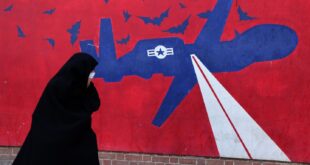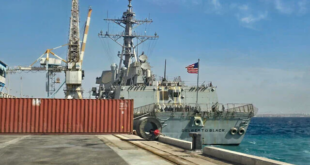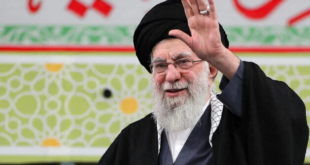 TEHRAN (FNA)- Austrian Foreign Minister Ursula Plassnik Monday reiterated her country’s support for a diplomatic solution to the nuclear standoff between Tehran and the West.
TEHRAN (FNA)- Austrian Foreign Minister Ursula Plassnik Monday reiterated her country’s support for a diplomatic solution to the nuclear standoff between Tehran and the West.
Meantime, the diplomat called on Iran to take the initiative to clarify the nature of its nuclear program, warning the country against playing for time.
Washington, Tel Aviv and their European allies accuse Tehran, a signatory to the nuclear Non-Proliferation Treaty (NPT), of conducting nuclear activities directed at developing a nuclear weapon.
Iran says that it only seeks the civilian applications of the technology, such as generating electricity for its national grid, which is currently suffering from major shortages.
In her Monday meeting with former Iranian president Mohammad Khatami, Plassnik said that the two sides must conduct constructive dialogue, Xinhua reported.
The Austrian minister declared that Vienna, which is home to the UN nuclear watchdog, is prepared to directly engage in dialogue with Iran over its nuclear program – a measure which the US has refused to take.
Despite the rules enshrined in the Non-Proliferation Treaty (NPT) entitling every member state, including Iran, to the right of uranium enrichment, Tehran is now under four rounds of UN Security Council sanctions for turning down West’s illegitimate calls to give up its right of uranium enrichment.
Tehran has dismissed West’s demands as politically tainted and illogical, stressing that sanctions and pressures merely consolidate Iranians’ national resolve to continue the path.
Iran insists that it should continue enriching uranium because it needs to provide fuel to a 300-megawatt light-water reactor it is building in the southwestern town of Darkhoveyn as well as its first nuclear power plant in the southern port city of Bushehr.
Iran currently suffers from an electricity shortage that has forced the country into adopting a rationing program by scheduling power outages – of up to two hours a day – across both urban and rural areas.
Iran plans to construct additional nuclear power plants to provide for the electricity needs of its growing population.
The Islamic Republic says that it considers its nuclear case closed as it has come clean of IAEA’s questions and suspicions about its past nuclear activities.
Political observers believe that the United States has remained at loggerheads with Iran mainly over the independent and home-grown nature of Tehran’s nuclear technology, which gives the Islamic Republic the potential to turn into a world power and a role model for other third-world countries. Washington has laid much pressure on Iran to make it give up the most sensitive and advanced part of the technology, which is uranium enrichment, a process used for producing nuclear fuel for power plants.
Washington’s push for additional UN penalties contradicts a recent report by 16 US intelligence bodies that endorsed the civilian nature of Iran’s programs. Following the US National Intelligence Estimate (NIE) and similar reports by the IAEA head – one in November and the other one in February – which praised Iran’s truthfulness about key aspects of its past nuclear activities and announced settlement of outstanding issues with Tehran, any effort to impose further sanctions on Iran seems to be completely irrational.
The February report by the UN nuclear watchdog, the International Atomic Energy Agency, praised Iran’s cooperation in clearing up all of the past questions over its nuclear program, vindicating Iran’s nuclear program and leaving no justification for any new UN sanctions.
The UN nuclear watchdog has so far carried out at least 14 surprise inspections of Iran’s nuclear sites so far, but found nothing to support West’s allegations.
Also in his latest report to the 35-nation Board of Governors, IAEA Director General Mohamed ElBaradei confirmed “the non-diversion” of nuclear material in Iran and added that the agency had found no “components of a nuclear weapon” or “related nuclear physics studies” in the country.
The IAEA report confirmed that Iran has managed to enrich uranium-235 to a level ‘less than 5 percent.’ Such a rate is consistent with the construction of a nuclear power plant. Nuclear arms production, meanwhile, requires an enrichment level of above 90 percent.
The Vienna-based UN nuclear watchdog continues snap inspections of Iranian nuclear sites and has reported that all “declared nuclear material in Iran has been accounted for, and therefore such material is not diverted to prohibited activities.”
Mohammed ElBaradei, chief of the International Atomic Energy Agency, recently said that Iran remains far from acquiring capabilities to develop nuclear weapons as it is still lacking the key components to produce an atomic weapon.
“They do not have even the nuclear material, the raw unenriched uranium to develop one nuclear weapon if they decide to do so,” said the head of the UN nuclear watchdog agency.
Many world nations have called the UN Security Council pressure against Iran unjustified, especially in the wake of recent IAEA reports, stressing that Tehran’s case should be normalized and returned to the UN nuclear watchdog due to the Islamic Republic’s increased cooperation with the agency.
Observers believe that the shift of policy by the White House to send William Burns – the third highest-ranking diplomat in the US – to the latest round of Iran-West talks happened after Bush’s attempt to rally international pressure against Iran lost steam due to the growing international vigilance.
US President George W. Bush finished a tour of the Middle East in winter to gain the consensus of his Arab allies to unite against Iran.
But hosting officials of the regional nations dismissed Bush’s allegations, describing Tehran as a good friend of their countries.
 Eurasia Press & News
Eurasia Press & News



